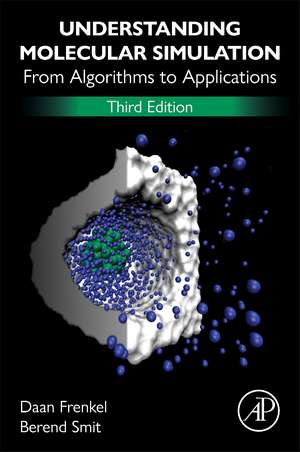Understanding Molecular Simulation: From Algorithms to Applications
Autor Daan Frenkel, Berend Smiten Limba Engleză Paperback – 18 iul 2023
Since the second edition’s publication, the simulation world has expanded significantly: existing techniques have continued to develop, and new ones have emerged, opening up novel application areas. This new edition aims to describe these new developments without becoming exhaustive; examples are included that highlight current uses, and several new examples have been added to illustrate recent applications. Examples, case studies, questions, and downloadable algorithms are also included to support learning. No prior knowledge of computer simulation is assumed.
- Fully updated guide to both the current state and latest developments in the field of molecular simulation, including added and expanded information on such topics as molecular dynamics and statistical assessment of simulation results
- Gives a rounded overview by showing fundamental background information in practice via new examples in a range of key fields
- Provides online access to new data, algorithms and tutorial slides to support and encourage practice and learning
| Toate formatele și edițiile | Preț | Express |
|---|---|---|
| Paperback (1) | 552.21 lei 5-7 săpt. | +78.75 lei 7-13 zile |
| ELSEVIER SCIENCE – 18 iul 2023 | 552.21 lei 5-7 săpt. | +78.75 lei 7-13 zile |
| Hardback (1) | 467.26 lei 5-7 săpt. | +127.59 lei 7-13 zile |
| ELSEVIER SCIENCE – 19 oct 2001 | 467.26 lei 5-7 săpt. | +127.59 lei 7-13 zile |
Preț: 552.21 lei
Preț vechi: 712.43 lei
-22% Nou
105.68€ • 109.40$ • 89.32£
Carte tipărită la comandă
Livrare economică 26 februarie-12 martie
Livrare express 29 ianuarie-04 februarie pentru 88.74 lei
Specificații
ISBN-10: 0323902928
Pagini: 679
Dimensiuni: 152 x 229 x 42 mm
Greutate: 1.18 kg
Ediția:3
Editura: ELSEVIER SCIENCE
Public țintă
Postgraduate students in physics and materials science departments studying molecular simulation techniques; scientists in the fields of polymers, materials science, and applied physics.Cuprins
Part I: Basics
2. Thermodynamics and Statistical Mechanics
3. Monte Carlo Simulations
4. Molecular Dynamics Simulations
5. Computer Experiments
Part II: Ensembles
6. Monte Carlo Simulations in Various Ensembles
7. Molecular Dynamics in Various Ensembles
Part III: Free -Energy Calculations
8. Free Energy Calculations
9. Free Energies of Solids
10. Free Energy of Chain Molecules
Part IV: Advanced Techniques
11. Long-Ranged Interactions
12. Configurational Bias Monte Carlo
13. Accelerating Monte Carlo Sampling
14. Time-Scale-separation Problems in MD
15. Rare Events
16. Mesoscopic Fluid Models
Part V: Appendices
A: Lagrangian and Hamiltonian
B: Non-Hamiltonian Dynamics
C: Non-equilibrium Thermodynamics
D: Smoothed Dissipative Particle Dynamics
E: Committor for 1-D diffusive barrier crossing
F: Linear Response Theory: examples
G: Statistical Errors
H: Integration Schemes
I: Saving CPU Time
J: Reference States
K: Statistical Mechanics of the Gibbs "Ensemble"
L: Overlapping Distribution for Polymers
M: Some General Purpose Algorithms
Recenzii
"... this book brilliantly lays down the scientific foundations of the simulational approach ..." --Prof. Kurt Binder in Physics World, 1997
"... a treasure. The book is a marvellous mix of just enough formalism with an informal and readable style, sufficient detail to understand methodological advances, appropriate mathematics ..." --Prof. Mark A. Ratner in Physics Today, 1997
Descriere
Understanding Molecular Simulation: From Algorithms to Applications explains the physics behind the "recipes" of molecular simulation for materials science. Computer simulators are continuously confronted with questions concerning the choice of a particular technique for a given application. A wide variety of tools exist, so the choice of technique requires a good understanding of the basic principles. More importantly, such understanding may greatly improve the efficiency of a simulation program. The implementation of simulation methods is illustrated in pseudocodes and their practical use in the case studies used in the text.
Since the first edition only five years ago, the simulation world has changed significantly -- current techniques have matured and new ones have appeared. This new edition deals with these new developments; in particular, there are sections on:
· Transition path sampling and diffusive barrier crossing to simulaterare events
· Dissipative particle dynamic as a course-grained simulation technique
· Novel schemes to compute the long-ranged forces
· Hamiltonian and non-Hamiltonian dynamics in the context constant-temperature and constant-pressure molecular dynamics simulations
· Multiple-time step algorithms as an alternative for constraints
· Defects in solids
· The pruned-enriched Rosenbluth sampling, recoil-growth, and concerted rotations for complex molecules
· Parallel tempering for glassy Hamiltonians
Examples are included that highlight current applications and the codes of case studies are available on the World Wide Web. Several new examples have been added since the first edition to illustrate recent applications. Questions are included in this new edition. No prior knowledge of computer simulation is assumed.







